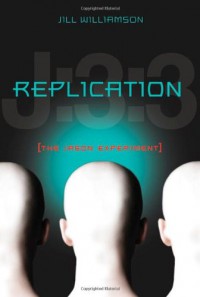 17-year-old Abby moves with her father, a scientist, to some small town in Alaska. He will work at a special and top-secret project, which turns out to be a cloning experiment. After he lost his wife to cancer a few years back, he seems to have lost perspective about how far science can go to save lives.
17-year-old Abby moves with her father, a scientist, to some small town in Alaska. He will work at a special and top-secret project, which turns out to be a cloning experiment. After he lost his wife to cancer a few years back, he seems to have lost perspective about how far science can go to save lives.Martyr, aka J:3:3 is a clone, one of over 40 others, who live at Jason Farms, an underground lab and prison to them. They are told the world is polluted so severely they wouldn’t be able to survive above ground, they also learned they will be “expiring” when turning 18 and their deaths will help humankind survive the hard times it is experiencing now. Martyr will turn 18 soon and his expiration is already scheduled. But he is desperate to see the sky for once, so he tries to escape, just for a quick glance as the pollution won’t do him any harm, now that he is almost 18. But when sneaking out of the lab he overhears the head of Jason Farms saying he won’t suffer as much anymore once Martyr’s kidneys were implanted into him. Martyr changes his plan and escapes Jason Farms on the back of the truck of Abby’s father.
The story is told alternately from the perspectives of Abby and Martyr and the suspense is held high all the way through the book, especially in the second half. The novel is set in wintery Alaska, and the atmosphere is described very vividly and beautifully.
The story offers a lot of interesting aspects and raises good questions about the morality of cloning and how far science should go to save lives. With expanding knowledge the boundaries of what is technically possible drift constantly and humanity has to draw its own lines about what is morally right and wrong. I enjoyed the way these questions were raised in this book.
Abby as a character is a strong lead, she fights off boys that need to be fought off and expresses her beliefs strongly. I liked her a lot. Martyr however was very naive and childlike throughout most of the book when it came to interactions with other people and also about his experiences in “the real world”. Abby clearly liked his innocent and childlike approach to love, I had some problems to see him as a love interest for anybody due to his childlike ways.
I am aware that Zondervan/Zonderkidz is a Christian publishing house and they publish a lot of Christian themed books. In this case however I found the religious answers towards cloning as being “wrong because God is the only creator of life and humans shouldn’t mess with the creation” too simple. The reader sees a lot of other reasons for it being wrong like misshaped clones, the clones being held as prisoners and guinea pigs, missing legal rights etc. but from Abby’s perspective it is simple “wrong because it isn’t God’s plan”. Abby as Martyr’s connection to the real world was explaining things to him too much from the religious perspective for my liking. It is one aspect to look at it, and an interesting one, but just one among many, as her “teacher” about the world she should have mentioned there are other believes too.
I also didn’t like the way Abby told Martyr about God as a proven fact. I understand she is convinced of the existence of God, but it felt wrong to me that she didn’t mention it is a belief and but a fact. The Pastor she turns to in need of help answers the questions Martyr has, but even he adds that there are a lot of people believing in other things and some believing in nothing at all, this seemed like a way more open view on religion, though I assume he is as convinced of the existence of God as Abby is. But unlike her he acknowledges the fast that it is a belief and that there are people believing in different things or nothing at all.
The book is a good and catchy read which makes the reader reflect about how far science should go I would have enjoyed more perspectives than the purely religious one. Some parts felt like a sermon to me. The questions about cloning and the rights of clones were very interesting to me though.


